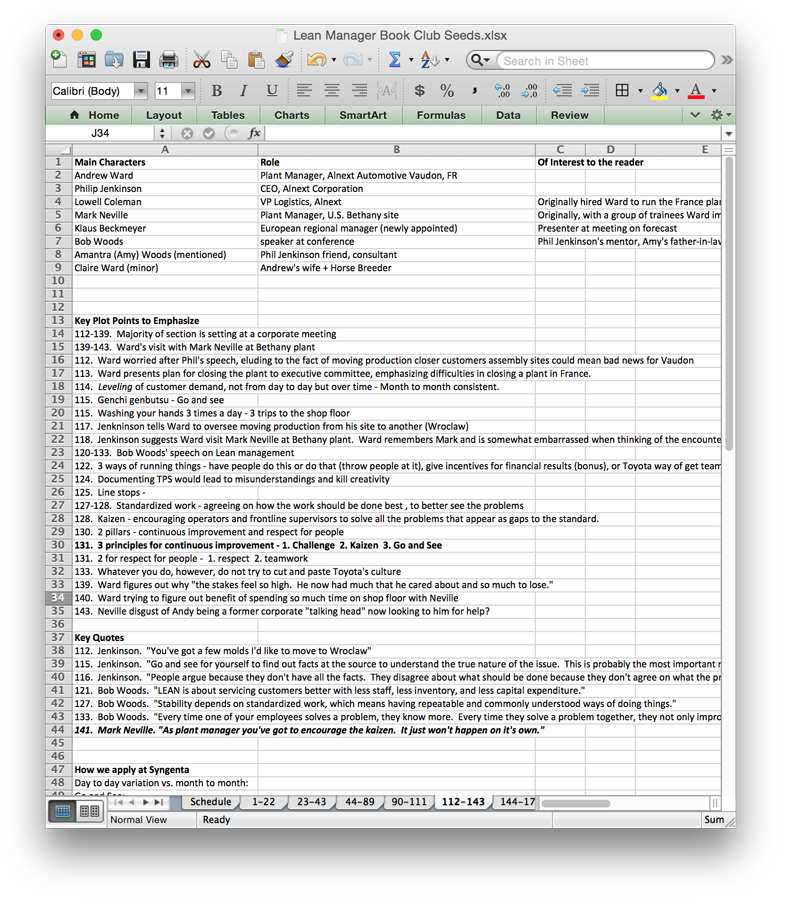At U.S. facilities of Syngenta, the Swiss agricultural giant, book clubs are sowing the seeds of lean management.
Syngenta at a Glance
|
The book clubs “solved a problem we were having,” explained Kelly Moore, Syngenta North America regional continuous improvement (CI) lead, at a chemical facility in St. Gabriel, LA. The challenge for her and Rhonda Birchmier, fellow regional CI lead, based in Ames, IA, was how to develop a common understanding of lean thinking and practice at Syngenta’s various production and research facilities in the U.S.
“How could we get people to come to a common picture, a common understanding of lean and also collaborate?” Moore said. “How could we do that? Well, let’s talk about a book.”
But an effort at a book club in 2009, just a few years into the company’s lean effort in the U.S., wasn’t effective. Club members read Leading Change by John Kotter, then posted answers online to questions prepared by the club leader, an executive.
“Individually, we read the book and individually we posted our comments into the document,” Moore recalled. “We could see what others had posted but I don’t recall that we interacted as a group. I don’t remember feeling that my views, or anyone else’s, were providing new or different insights. Our current book clubs, with real dialogue in the groups, are working.”
Improved Process
Moore and Birchmier took charge of the book club effort later that year by developing a format designed to foster dialogue and participation. Although they make most of the book recommendations, anyone who has read a relevant business book can recommend it or form a club.
“Kelly and I are thrilled when we hear a new book club has formed,” Birchmier said. “To us it shows that someone got value from a previous club and now wants to share with others.”
The improved process calls for a club organizer to create an Excel spreadsheet with a separate tab for every 25-30 book pages. For each tab, the organizer summarizes concepts covered, lists key quotes, and briefly describes how the concepts might apply at Syngenta. Club members, generally 8-25 people, take turns leading discussions around the key concepts covered in the pages corresponding to each tab. During the discussions, leaders add notes to the worksheets.

A worksheet for pages 112-143 from the book club for The Lean Manager, showing characters and discussion topics. Source: Syngenta.
If the book is a business novel, organizers also list relevant characters and titles on the worksheet. They also spread the word about the club forming. There are no formal announcements, which keep groups at a manageable size. Clubs are usually designed around specific work groups.
If the organizer is new to the club process, Moore or Birchmier will set up the spreadsheet and tabs. “We’ll lead the first meeting or two to model behavior, then as club members host each following session we hang back as much as we can to allow idea and knowledge sharing,” Birchmier said.

The first spreadsheet tab for The Lean Manager club shows leader responsibilities, including who will lead chapter discussions so far. Source: Syngenta.
Clubs meet for 45 minutes every week or every other week. “If you get past 2 weeks, you forget what you read,” Birchmier said. The 45 minute length provides a 15-minute buffer so everyone can finish their thoughts without going past the hour if a meeting runs long.
When a book is done, its spreadsheet goes on a server for reference and sharing. For instance, a club might want to read the same book that another club has finished. The first club’s spreadsheet is copied as a template for the next group, since the tabs are already set up, but any content from the first club is deleted. “We want to give the current chapter leaders blank pages so they are unbiased to pick out and share what they find interesting in their chapter and most importantly, why it resonated with them,” Birchmier said.
Importance of Pace
Moore and Birchmier rolled out the new format within their respective facilities. The format spread as people moved to other locations. “Individual sites now have book clubs. Departments have book clubs. Leadership teams have book clubs!” said Moore, noting that an executive recently organized his reports into a club on Managing to Learn by LEI CEO John Shook.
Most clubs rely on company web conferencing software to hold virtual meetings. Site or departmental clubs meet face-to-face in conference rooms. Moore and Birchmier generally lead or support clubs as part of their CI responsibilities.
Selecting a tempo of 25-30 pages to read for each club meeting has advantages. “We do this slow pace for multiple reasons,” Moore explained. “First, if the group is large, we’re going slowly so that anyone who has something to say will have time to say it. Second, if we take a larger section of a book, we risk glossing over important points. Lastly, many people have a hard time carving out time to read but most can squeak in 25-30 pages before a meeting, which means we will have more participation. Participation and discussion are our main objectives.”
The club discussions also generate a shared understanding about lean management. “To say you’re on a journey to become lean, or striving for operational excellence – what does that look like?” Moore said. “That’s like saying, ‘We’re going to Utopia.’ My picture of Utopia might be different that yours. But when we discuss topics in these books and share our ideas, collectively the pictures in our minds [of lean thinking and practice] begin to merge towards one picture.”
The clubs may also be changing behaviors. “We’ve witnessed a few leaders have behavior changes after book clubs – was it the result of the books? We don’t know for sure.”
What Birchmier is certain about is the power of the discussions. “People start saying, ‘Oh you know, on my site I did this,’ and then the discussion will go from talking about a book to all of the sudden we’re having an in-depth discussion on how you implement a best practice.” Such discussions lead to real learning that complements the company’s online and traditional training. Furthermore, collaborative relationships are developed that possibly wouldn’t have occurred otherwise.
Novel Advantages
Moore and Birchmier prefer to use business novels in clubs, agreeing that “we want to make sure that people also are entertained a little bit. We don’t want [reading] to be painful.”
Novels have another advantage, particularly at the start of a club. If the discussions are a little slow to develop around lean concepts, which may be new to some participants, “we can describe what we see the characters doing,” Moore said. “You know, Mr. Ballé has done a great job of giving us characters that we can talk about.”
The talk leads to real learning that complements the company’s online and traditional training. “People start saying, ‘Oh you know, on my site I did this,’ and then it’ll go from talking about a book to all of the sudden we’re having an in-depth discussion on how you implement a best practice.”
Challenges
The biggest challenge clubs face is member commitment. “It’s easy to accept a meeting notice and to buy a book,” Birchmier said. “Keeping the book club as a priority you’re committed to is the challenge. We appreciate the dedication because we know it is a juggling act at work.
Moore and Birchmier offer these startup tips to CI professionals or other leaders organizing business book clubs:
- Consider your audience and what information or skills it needs.
- Start with business novels by Ballé, Pascal Dennis, Jerrold Solomon, or Eli Goldratt before jumping into the traditional business management books.
- Don’t impose too many rules or an onerous book summary template.
- Go for it!
Next Steps
Experiment with a book club! Running one got easier with publication of The Gold Mine Trilogy Guide. It’s designed to support, challenge, and facilitate as you and your team discuss and practice the lessons in the award-winning book set of Lead With Respect, The Gold Mine, and The Lean Manager. Each chapter contains:
- A summary.
- Author explanations of the significance of each chapter and how specific tools embody specific lean principles.
- Key ideas contained in the chapter.
- Reflection questions to guide your conversations.






